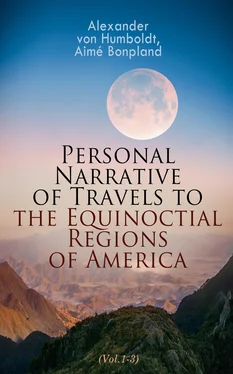In proportion as travels have been undertaken by persons whose views have been directed to researches into descriptive natural history, geography, or political economy, itineraries have partly lost that unity of composition, and that simplicity which characterized those of former ages. It is now become scarcely possible to connect so many different materials with the detail of other events; and that part of a traveller's narrative which we may call dramatic gives way to dissertations merely descriptive. The numerous class of readers who prefer agreeable amusement to solid instruction, have not gained by the exchange; and I am afraid that the temptation will not be great to follow the course of travellers who are incumbered with scientific instruments and collections.
To give greater variety to my work, I have often interrupted the historical narrative by descriptions. I first represent phenomena in the order in which they appeared; and I afterwards consider them in the whole of their individual relations. This mode has been successfully followed in the journey of M. de Saussure, whose most valuable work has contributed more than any other to the advancement of science. Often, amidst dry discussions on meteorology, it contains many charming descriptions; such as those of the modes of life of the inhabitants of the mountains, the dangers of hunting the chamois, and the sensations felt on the summit of the higher Alps.
There are details of ordinary life which it may be useful to note in an itinerary, because they serve for the guidance of those who afterwards journey through the same countries. I have preserved a few, but have suppressed the greater part of those personal incidents which present no particular interest, and which can be rendered amusing only by the perfection of style.
With respect to the country which has been the object of my investigations, I am fully sensible of the great advantages enjoyed by persons who travel in Greece, Egypt, the banks of the Euphrates, and the islands of the Pacific, in comparison with those who traverse the continent of America. In the Old World, nations and the distinctions of their civilization form the principal points in the picture; in the New World, man and his productions almost disappear amidst the stupendous display of wild and gigantic nature. The human race in the New World presents only a few remnants of indigenous hordes, slightly advanced in civilization; or it exhibits merely the uniformity of manners and institutions transplanted by European colonists to foreign shores. Information which relates to the history of our species, to the various forms of government, to monuments of art, to places full of great remembrances, affect us far more than descriptions of those vast solitudes which seem destined only for the development of vegetable life, and to be the domain of wild animals. The savages of America, who have been the objects of so many systematic reveries, and on whom M. Volney has lately published some accurate and intelligent observations, inspire less interest since celebrated navigators have made known to us the inhabitants of the South Sea islands, in whose character we find a striking mixture of perversity and meekness. The state of half-civilization existing among those islanders gives a peculiar charm to the description of their manners. A king, followed by a numerous suite, presents the fruits of his orchard; or a funeral is performed amidst the shade of the lofty forest. Such pictures, no doubt, have more attraction than those which pourtray the solemn gravity of the inhabitant of the banks of the Missouri or the Maranon.
America offers an ample field for the labours of the naturalist. On no other part of the globe is he called upon more powerfully by nature to raise himself to general ideas on the cause of phenomena and their mutual connection. To say nothing of that luxuriance of vegetation, that eternal spring of organic life, those climates varying by stages as we climb the flanks of the Cordilleras, and those majestic rivers which a celebrated writer (M. Chateaubriand.) has described with such graceful accuracy, the resources which the New World affords for the study of geology and natural philosophy in general have been long since acknowledged. Happy the traveller who may cherish the hope that he has availed himself of the advantages of his position, and that he has added some new facts to the mass of those previously acquired!
Since I left America, one of those great revolutions, which at certain periods agitate the human race, has broken out in the Spanish colonies, and seems to prepare new destinies for a population of fourteen millions of inhabitants, spreading from the southern to the northern hemisphere, from the shores of the Rio de la Plata and Chile to the remotest part of Mexico. Deep resentments, excited by colonial legislation, and fostered by mistrustful policy, have stained with blood regions which had enjoyed, for the space of nearly three centuries, what I will not call happiness but uninterrupted peace. At Quito several of the most virtuous and enlightened citizens have perished, victims of devotion to their country. While I am giving the description of regions, the remembrance of which is so dear to me, I continually light on places which recall to my mind the loss of a friend.
When we reflect on the great political agitations of the New World, we observe that the Spanish Americans are by no means in so favourable a position as the inhabitants of the United States; the latter having been prepared for independence by the long enjoyment of constitutional liberty. Internal dissensions are chiefly to be dreaded in regions where civilization is but slightly rooted, and where, from the influence of climate, forests may soon regain their empire over cleared lands if their culture be abandoned. It may also be feared that, during a long series of years, no foreign traveller will be enabled to traverse all the countries which I have visited. This circumstance may perhaps add to the interest of a work which pourtrays the state of the greater part of the Spanish colonies at the beginning of the 19th century. I even venture to indulge the hope that this work will be thought worthy of attention when passions shall be hushed into peace, and when, under the influence of a new social order, those countries shall have made rapid progress in public welfare. If then some pages of my book are snatched from oblivion, the inhabitant of the banks of the Orinoco and the Atabapo will behold with delight populous cities enriched by commerce, and fertile fields cultivated by the hands of free men, on those very spots where, at the time of my travels, I found only impenetrable forests and inundated lands.
***
CHAPTER 1.1. PREPARATIONS. INSTRUMENTS. DEPARTURE FROM SPAIN. LANDING AT THE CANARY ISLANDS.
Table of Contents
From my earliest youth I felt an ardent desire to travel into distant regions, seldom visited by Europeans. This desire is characteristic of a period of our existence when appears an unlimited horizon, and when we find an irresistible attraction in the impetuous agitations of the mind, and the image of positive danger. Though educated in a country which has no direct communication with either the East or the West Indies, living amidst mountains remote from coasts, and celebrated for their numerous mines, I felt an increasing passion for the sea and distant expeditions. Objects with which we are acquainted only by the animated narratives of travellers have a peculiar charm; imagination wanders with delight over that which is vague and undefined; and the pleasures we are deprived of seem to possess a fascinating power, compared with which all we daily feel in the narrow circle of sedentary life appears insipid. The taste for herborisation, the study of geology, rapid excursions to Holland, England, and France, with the celebrated Mr. George Forster, who had the happiness to accompany captain Cook in his second expedition round the globe, contributed to give a determined direction to the plan of travels which I had formed at eighteen years of age. No longer deluded by the agitation of a wandering life, I was anxious to contemplate nature in all her variety of wild and stupendous scenery; and the hope of collecting some facts useful to the advancement of science, incessantly impelled my wishes towards the luxuriant regions of the torrid zone. As personal circumstances then prevented me from executing the projects by which I was so powerfully influenced, I had leisure to prepare myself during six years for the observations I proposed to make on the New Continent, as well as to visit different parts of Europe, and to explore the lofty chain of the Alps, the structure of which I might afterwards compare with that of the Andes of Quito and of Peru.
Читать дальше












